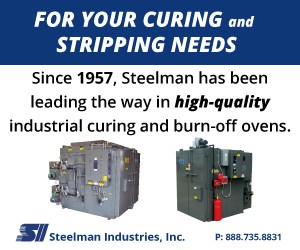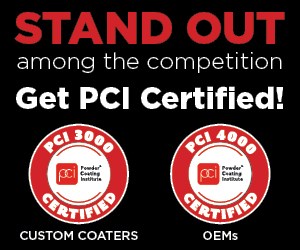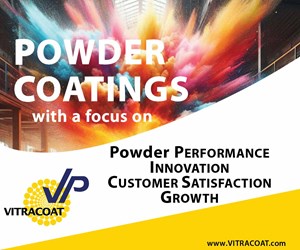Rust Prevention
Is our process for pretreatment and powder coating of outdoor enclosures good enough to prevent rust from appearing, and, if so, how long would it last?
Q. Below is the specification given for pretreatment and powder coating of the outdoor enclosures that I have to coat:
• Zinc phosphate (as basic coating) or blast cleaning (SA 2.5 with a profile of 40-80 micron)
• Coating thickness of electroplating should be 4-5 microns.
• Curing time should be maintained as per manufacturer recommendation.
• Color: RAL7035
• Finish: semi-matt
• Polyester TGIC-free powder coating
• Coating thickness should be 80-100 microns.
Is this good enough to prevent rust from appearing, and, if so, how long would it last? Ten or 20 years? Also, which will be better: zinc phospate or blast cleaning? —D.F.
A. Your questions cannot be answered in precise terms. Rust is impacted by many things besides the coating and method of preparation. The design of the part also is important. If there are areas that are hard to cover with an adequate thickness they may fail faster than the rest of the part. Seams, inside corners, holes, edges and other areas may be more vulnerable to rust than flat surfaces.
The installation also is important. If holes are drilled or parts are scratched, the coating may fail more rapidly where it is damaged. The installation site where the part is located is a big issue. Miami, Fla., is tougher on a coating than Spokane, Wash., for example.
The bottom line is that there is no sure way to say that rust will not appear. In most cases some rust will occur at some time. A steel part that is properly prepared, coated and installed could last a long time with limited rust. As outlined above, precise measurement is not possible without some particulars on design and location. Five to 10 years is reasonable if the job is done correctly. If the part is designed to make it easy to coat and you prepare the surface right, use a good primer coat and apply a durable topcoat, the product could last even longer with minimal wear.
The question of whether zinc phosphate or blasting is better is tough to answer, too. Zinc phosphate provides a barrier coating, and it can provide substantial corrosion resistance. Blasting provides an excellent anchor pattern and adhesion over time. What is important is that the coating and preparation are working together towards the goal of corrosion resistance. Personally, if I was going outside with steel, I would want to blast, powder prime and powder topcoat.
The specification is somewhat confusing. Electroplating? This is not clear at all. Why electroplate and what type of plating? Chrome, zinc or nickel? I would much prefer powder primer at 75 to 100 micron. If the surface is blasted and you use a powder primer with zinc, you will have a great corrosion barrier.
In general, I would recommend a blasted surface with a garnet or aluminum oxide media to around 50 micron, followed by a zinc-containing powder primer and the specified topcoat. If you do that correctly, you should get very limited rust for at least 10 years in a fairly harsh environment.
Related Content
12 Ways to Improve Your Powder Coating Quality
Often overlooked powder coating procedures that can help you elevate your quality, streamline your operations and improve your profitability.
Read MoreLow-Temperature-Cure Powder Coatings Offer Unique Opportunities
An in-depth look at the advantages of low-temperature-cure powder coatings and the considerations for incorporating them into your process.
Read MoreTTX’s Automated Conveyor Carrier System Offers Wireless, Flexible Operation
ACC system designed for reliable, consistent point-to-point movement of everything from small to heavy parts.
Read MoreConveyors and Paint Systems
Choosing the right conveyor system, coating technology, and ancillary equipment.
Read MoreRead Next
A ‘Clean’ Agenda Offers Unique Presentations in Chicago
The 2024 Parts Cleaning Conference, co-located with the International Manufacturing Technology Show, includes presentations by several speakers who are new to the conference and topics that have not been covered in past editions of this event.
Read MoreEducation Bringing Cleaning to Machining
Debuting new speakers and cleaning technology content during this half-day workshop co-located with IMTS 2024.
Read MoreDelivering Increased Benefits to Greenhouse Films
Baystar's Borstar technology is helping customers deliver better, more reliable production methods to greenhouse agriculture.
Read More

























